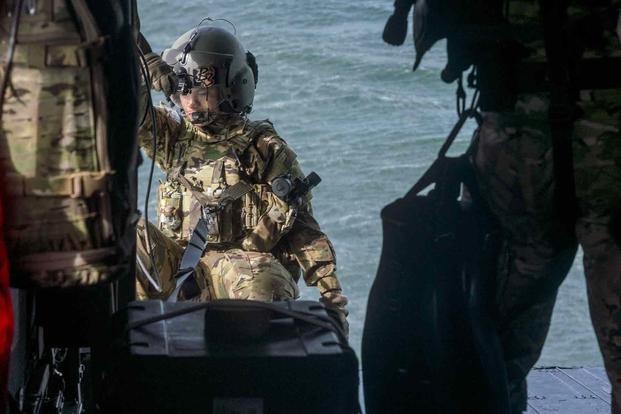Women in Army special operations face "blatant sexism," particularly among senior noncommissioned officers who say they dread the idea of working with women and would never respect a female superior, according to a lengthy internal study released by the service on Monday.
There are 2,300 women serving in Army special operations -- mostly in support roles -- making up 8% of a military community that includes Special Forces and Rangers. However, fewer than 10 women are Green Berets, with the first coming from the National Guard three years ago.
Overall, women have made significant strides in the military in recent years, with then-Defense Secretary Ash Carter finally opening all positions and occupations -- including ground combat roles -- to them in 2015 after generations of service. But the Army study indicates female soldiers still face sexism and discrimination in the most elite echelons of the military, where their numbers still remain relatively low.
Read Next: Pentagon Set to Allow Calculator Use on Military Entrance Exam as Recruiting Slumps
"I dread the day a woman arrives on a Team and I hope I am retired by the time that happens," one noncommissioned officer, or NCO, wrote in a survey with anonymous comments that was included in the Army study.
The Army conducted the study in 2021 to identify key challenges for women in special operations. Numerous other soldiers, mostly NCOs, made similar, blunt and sexist comments, all with a common theme: Women have no place in special operations.
"Do you think they are pursuing career opportunities? Please, be honest," one NCO wrote in the survey anonymously. "They are looking for a husband, boyfriend or attention. And they get it. Because the men that choose to lay down their lives and do missions that only great men can do are warriors.'
"Warriors do warrior s--t. Women like warriors. These are facts," the NCO continued. "Play pretend circus all you want, this is the truth. I know this won't get read because it will be screened beforehand, so whatever."
Female soldiers in the survey describe double standards for women and men in Army special operations.
In some cases, they were scorned for wearing yoga pants during physical training because the clothing was seen as too revealing. Meanwhile, men wore so-called "Ranger panties," silky shorts that are shorter than most boxer-style underwear. Male soldiers also routinely work out shirtless while on duty.
In special ops careers, the women reported having to work much harder than men -- with virtually no room for error. They also reported being passed over for jobs that went to less qualified men.
"I was not selected because they didn't like me," one woman anonymously reported in the survey. "I've seen men get selected that didn't have SERE [survival, evasion, resistance and escape training] or airborne."
Another woman said, "There are no boards. Women have to interview but the men do not. There are senior women with deployed experience but other [NCOs] come in and they get placed in first sergeant positions. The men get 'dibs' on jobs."
The Army admitted Monday the special operations community has a problem.
"We still have a lot of work to do. Changing culture takes time," Lt. Gen. Jonathan Braga, head of Army Special Operations Command, told reporters Monday. "We have to be better. We must be better because our nation depends on it. ... It needs to be better. ... I'm not proud of some of those comments."
The problem of rampant sexism in Army special operations is partly due to a generational divide. The Army service-wide is in many cases run by older men in influential roles who share antiquated views on women.
Braga noted that the small pool of female Green Berets is slowly changing those views on women.
Special operations has also long been an overwhelmingly masculine environment, often described as one of the last bastions of an old-school boys club. It isn't out of the ordinary that a man can join special operations straight out of high school and work a significant part of his career while having limited interactions with women in the workplace.
Still, women have served with special operations for decades and were particularly helpful in Afghanistan, where they worked with Afghan women who faced shame or risked beatings if caught interacting with male troops.
Female soldiers have also expanded their footprint in the conventional Army. In 2019, Maj. Gen. Laura Yeager became the first woman to lead an Army division, serving as commander of the California National Guard's 40th Infantry Division.
Command Sgt. Maj. JoAnn Naumann currently serves as the first female senior enlisted leader for Army special operations. She took the role in April after Michael Weimer left to become the sergeant major of the Army.
"I have heard all of the things; some of it falls into misogyny," Naumann told reporters in a roundtable. "I don't think Army [special operations] has a monopoly on misogyny.
"Some of the ignorant comments are people who simply aren't educated. Education is how we fix this," she said. "But the vast majority aren't that way; most of the mentors and advocates in my career were male. I am here today because there are some phenomenal men in our formation."
-- Steve Beynon can be reached at Steve.Beynon@military.com. Follow him on Twitter @StevenBeynon.
Related: The Female Soldier Insurgency that Helped Rewrite the Army's Rules on Parenthood














